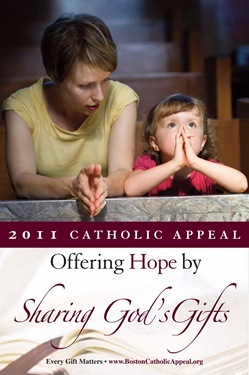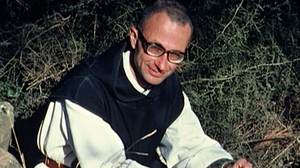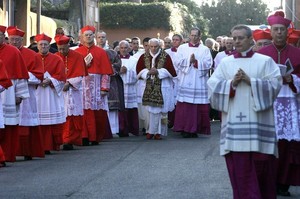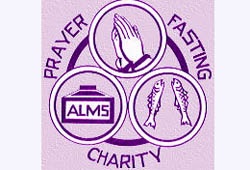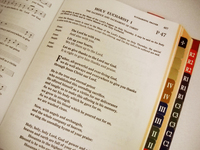 The English speaking world will begin to pray the new translation of the Roman Missal (2002) on the First Sunday of Advent.
The English speaking world will begin to pray the new translation of the Roman Missal (2002) on the First Sunday of Advent.
Charitable work and the common fund: 2 wings of the Christian witness
 I always look for evidence –that is, I am looking for light on a situation that may not be very clear for me– i.e., for the reality, the truth and beauty of a vigorous Catholic life by seeing if people are willing to live the Gospel. We do our best given the graces we’ve received and our own open hearts. I find myself in need to know that others belief that that the promises (and extraordinary claims) of Christ are true and are lived. Novel, right? Not really. We Catholics have been concerned for the welfare of others since the time Jesus and because our Christianity has its roots in Judaism, even before Jesus. Just read the Old Testament and dig into the narrative there. But it is Jesus gives a new lens by which to see life and to live differently today by the fact of the Paschal Mystery (His life, death, resurrection and ascension).
I always look for evidence –that is, I am looking for light on a situation that may not be very clear for me– i.e., for the reality, the truth and beauty of a vigorous Catholic life by seeing if people are willing to live the Gospel. We do our best given the graces we’ve received and our own open hearts. I find myself in need to know that others belief that that the promises (and extraordinary claims) of Christ are true and are lived. Novel, right? Not really. We Catholics have been concerned for the welfare of others since the time Jesus and because our Christianity has its roots in Judaism, even before Jesus. Just read the Old Testament and dig into the narrative there. But it is Jesus gives a new lens by which to see life and to live differently today by the fact of the Paschal Mystery (His life, death, resurrection and ascension).
Continue reading Charitable work and the common fund: 2 wings of the Christian witness
Boston’s Charity’s Appeal
JPII Generation says thanks to their hero
 Headline Bistro is collecting testimony on the ways in which Pope John Paul II has been influential in our lives. The so-called “JPII Generation” is a powerfully impacted by the life, ministry and teaching of this giant of Catholicism.
Headline Bistro is collecting testimony on the ways in which Pope John Paul II has been influential in our lives. The so-called “JPII Generation” is a powerfully impacted by the life, ministry and teaching of this giant of Catholicism.
Can Lent help restore joy?
Is not this the fast that I choose: to loose the bonds of wickedness, to undo the thongs of the yoke, to let the oppressed go free, and to break every yoke? Is it not to share your bread with the hungry, and bring the homeless poor into your house; when you see the naked, to cover him, and not to hide yourself from your own flesh? Then shall your light break forth like the dawn, and your healing shall spring up speedily; your righteousness shall go before you, the glory of the Lord shall be your rear guard.
Kurt Koch to meet Kyril I
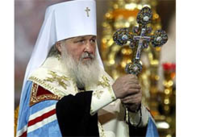 Swiss Cardinal Kurt Koch will be going to Moscow this weekend to meet Patriarch Kyril and Russian Orthodox Church leaders.
Swiss Cardinal Kurt Koch will be going to Moscow this weekend to meet Patriarch Kyril and Russian Orthodox Church leaders.
Is there a desire for God still present today?
A few days ago I recommended seeing “Of Gods and Men.” Last week I saw the film and I have still been thinking of the movie, the monks, the hard work of inter-religious dialog. The testament of Dom Christian de Cherge can be read here. I highly recommend reading what Prior Christian said and what others think. A group of friends took time to see the movie together. Two friends brought a perspective of the film to my attention recently. The following is an an answer to those who ask whether a desire for God is still present in our times. Angelo Scola writes:
I believe that the worldwide success of the film on the Tibhirine
monks [U.S. Title: “Of Gods and Men”] reflects a burning desire in the men and
women of any latitude to meet the face of God; it therefore reflects the real
need we all feel for authentic witnesses who may help us keep our gazes focused
upwards.
Authentic witness is, in fact, not limited to “giving a good example”.
It shines in all its wholeness as a method for practically knowing reality and
communicating truth. It is a primary value, standing above any other form of
knowledge and communication – scientific, philosophical, theological, artistic,
etc.
A luminous example of this method is offered by the very words which Fr
Christian de Chergé, prior of the Trappist monastery of Notre-Dame de l’Atlas
in Tibhirine, Algeria, wrote in his spiritual will [noted above], a good three years before
he was massacred with his monks:
“When the time comes, I would like to be able
to have an instant of lucidity that would allow me to ask for the pardon of God
and that of men, my brothers, while forgiving with all my heart those who may
have hit me… I cannot see how I could, in fact, rejoice in that this people I
love could be accused of my assassination. It
Continue reading Is there a desire for God still present today?
Healing and forgiveness: a spiritual & psychological path to renewal
 Earlier today I had the space of time to begin my lenten observance by thinking about healing and forgiveness. Without these two legs of the spiritual life personal renewal won’t happen. A talk was hosted by the Franciscan Life Center in Meriden, Connecticut, a ministry of the Franciscan Sisters of the Eucharist. The executive director of the FLC Sister Barbara Johnson, FSE, made the presentation to about 75 people.
Earlier today I had the space of time to begin my lenten observance by thinking about healing and forgiveness. Without these two legs of the spiritual life personal renewal won’t happen. A talk was hosted by the Franciscan Life Center in Meriden, Connecticut, a ministry of the Franciscan Sisters of the Eucharist. The executive director of the FLC Sister Barbara Johnson, FSE, made the presentation to about 75 people.
Continue reading Healing and forgiveness: a spiritual & psychological path to renewal
Lent’s a time to be converted because we need a new heart
At the ancient
Roman Basilica of Santa Sabina known today as the mother church of the Order of
Preachers, the Pope began Lent with the reception of ashes. The imposition of ashes is not ritualistic sign without meaning: we put ashes on our heads not in contradiction of the Gospel chosen for that day but as a way to remind ourselves that an outward sign conveys an inward reality. He first began the Lenten prayer at the
Benedictine Church of Sant’Anselmo (just down the street from Santa Sabina).
There he gathered with the monks, priests, bishops , cardinals and laity for a
visit to the Blessed Sacrament, brief service of prayer and a procession to
Santa Sabina where Holy Mass was celebrated. Yes, the pope walks the streets of Rome, but in a limited way. It is a gesture full of beauty. This is ancient way for the Roman
Pontiff to lead the Church into a season of penance and preparation for the
sacred Triduum. The Holy Father’s homily is below.
We begin today the
liturgical season of Lent with the thought-provoking rite of the imposition of
ashes, through which we wish to take on the commitment to convert our hearts to
the horizons of grace. In general, in common opinion, this time runs the risk
of being marked by sadness, by the darkness of life. Instead, it is a precious
gift of God; it is an intense time full of meanings in the journey of the
Church; it is the itinerary to the Lord’s Easter. The biblical readings of
today’s celebration give us indications to live this spiritual experience
fully.
Continue reading Lent’s a time to be converted because we need a new heart
Beginning today, will Lent change my life?
Yesterday’s Scripture reading at Mass from Tobit was a great entry into the great season of Lent: blinded for four years, Tobit’s whole life changed. His lent, as it were, provided him the graced-filled opportunity to make some necessary changes in his relationship with God and other, not mention he softened his demeanor. In time, God heals his physical and spiritual blindness. If you get a chance, read the Book of Tobit. One has to ask, to what am I blinded to and how do I want God to heal me.
In his audience today the Pope recalled for us that “The Fathers of the Church teach that these three pious exercises are closely related: indeed, Saint Augustine calls fasting and almsgiving the “wings of prayer,” since they prepare our hearts to take flight and seek the things of heaven, where Christ has prepared a place for us.”
For those who believe in Christ and follow his path, the “Christian life is a ‘road’ to be travelled, it consists not so much of a law to be observed, but in meeting, welcoming and following Christ”. We meet the Lord Jesus “in the light and joy of the resurrection, the victory of life, love and good, then we too have to take up the cross of everyday life.”
Lent begins today, “let us accept Christ’s invitation to follow him more closely, renew our commitment to conversion and prayer, and look forward to celebrating the Resurrection in joy and newness of life.”
At the end of the lenten 40 days, how do I want to be different from who I am today? In what concrete ways will I allow prayer, fasting and almsgiving to be tools for my own education in the faith as Christ proposes to me? Will I have a renewed understanding of the Cross and the Resurrection of Jesus Christ that totally changes my life?
